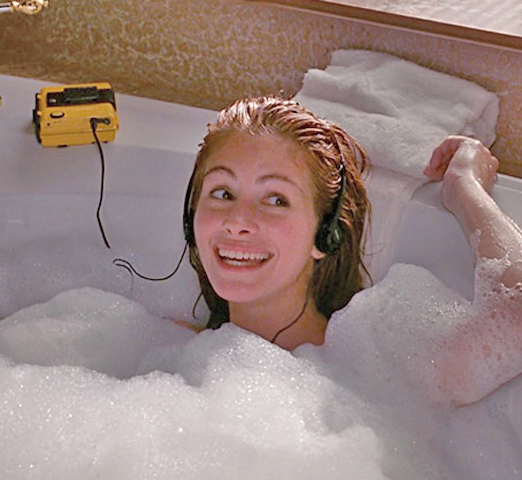by Chris Feil
 Decades later, it’s still easy to fall for the charms of Pretty Woman - despite maybe being a problematic fave for how it softens the struggles of sex workers. That feel-good fantasy is aided by a pleasing adult-contempo soundtrack, and one that half-comments on the situation as it charms us. It’s a modern variation on the Pygmalion/My Fair Lady archetype and packed with musical moments, so it makes sense that it is on its way to a stage musical treatment. Go West’s “King of Wishful Thinking” makes for a buoyant opening number of wishful love to start our hearts fluttering, before fading into equally crowd-pleasing tracks that dance around the love story’s circumstance.
Decades later, it’s still easy to fall for the charms of Pretty Woman - despite maybe being a problematic fave for how it softens the struggles of sex workers. That feel-good fantasy is aided by a pleasing adult-contempo soundtrack, and one that half-comments on the situation as it charms us. It’s a modern variation on the Pygmalion/My Fair Lady archetype and packed with musical moments, so it makes sense that it is on its way to a stage musical treatment. Go West’s “King of Wishful Thinking” makes for a buoyant opening number of wishful love to start our hearts fluttering, before fading into equally crowd-pleasing tracks that dance around the love story’s circumstance.
As it introduces our heroine, the film plays into more cliched audience perceptions of a sex worker to music video effect. There’s a heavy layer of sweaty sleaze in Christopher Otcasek’s “Real Wild Child (Wild One)”, the kind of song you can smell. This is what 1990 forbidden sex sounded like, and the images paired with the song are the kind of soft core faceless disembodiment of male gaze idolatry that dehumanizes and objectifies.
But as Vivian emerges, she is hardly the wild child the song makes us expect. If she’s the “hooker with a heart of gold” trope, this song plays into the audience’s anticipation for something more kinkier and grungier - which the the film steadily denies it as the story unfolds.
This musical moment has an antithesis in “Wild Women Do” by Natalie Cole, a badass anthem that actually references payment for sexual presence. Instead there is the faceless of storefront mannequins and a different kind of female image being demanded of Vivian. The track is maybe the closest the film gets to something truly sex-positive or positioning her as more empowered, at least lyrically. However it moreso highlights what a fish out of water she is among the supposed high class of Rodeo drive.
The alternate take and embodiment of its sanitized romantic fantasy is its title inspiration, Roy Orbison’s “Oh, Pretty Woman”. Sure its titular feminine vision is depicted walking down a street (is this supposed to be a wink from the movie?), but this lustful track’s age and relative demureness make it comparatively tame. At this moment when Vivian is becoming most accepted, the use of a classic track does a lot to make us think of traditional images of femininity and romance.
Oh, and it’s not like we’re not submitting to the unreality for the sake of easy enjoyment. Unlike the abrupt disappointment after “Wild Women Do”, this sequence is nothing but a revelry in shopping, accessories, and costumes (and a pizza). We just get so happy when they finally let her shop.
Even her heartbreak is palpably realized to relatable effect with Roxette’s “It Must Have Been Love”. The power ballad is matched to Julia’s power suit and barely contained sadness, a classic breakup musical moment if there ever was one. If this song doesn’t immediately emotionally transport you into the back of a somber limousine, check your pulse and cultural references. By now the audience should connect to Vivian’s heartache regardless of circumstance and a track like this certainly helps.
Another of the film’s narrative inspirations features prominently in its musical glamorization: Verdi’s La Traviata. Here we’re reminded that a courtesan love story isn’t revolutionary and from a medium that also seeks to appeal through emotion. As Vivian is swept away with feeling by the opera, she is also able to tap into the most (however tragic) romantic version of her circumstance.
Naturally as Vivian and Edward’s love story concludes, La Traviata becomes their ultimate love anthem - one that also ignores a few particulars of circumstance.
All Soundtracking installments can be found here!